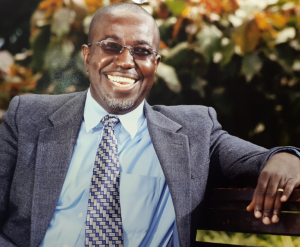Daniel Kamanga
Director of Communication & Public Acceptance for Africa Harvest Biotech Foundation International
Expert Bio
Daniel G. Kamanga serves as the director of communication & public acceptance for Africa Harvest Biotech Foundation International (AHBFI), an international NGO with head office in Nairobi and offices in Washington D.C. and Johannesburg. The organization has projects spread across Nigeria, Kenya, Tanzania, Uganda, Ethiopia, South Africa, Ghana and Burkina Faso.
Daniel has the communication oversight of the multi-institutional Africa Biofortified Sorghum (ABS) Project. He was part of a team of communication specialists that trained PIs of the Bill and Melinda Gates Foundation (BMGF)-funded projects. He provided leadership for CropLife International (CLI)-funded projects for over five years and continues to oversee biotech outreach work in Ghana and Burkina Faso.
He has extensive media networks in Africa, having been an Associate Editor of the Nation in Kenya. He has written for various African and international publications and is the co-editor (with Dr. Florence Wambugu) of a recent book, Biotechnology in Africa: Emergence, Initiatives and Future.
He has an MBA from Durham University in the UK and two other degrees – in Communication and Economics – from the University of Nairobi in Kenya.
Studies, Articles and Answers
Showing 2 out of 2 results
Question
Q: Which countries in Africa have banned GMOs?
A: Which countries in Africa have banned GMOs? In Africa, only Kenya has banned the importation of food containing GMOs. The process of the ban was flawed and occurred during the previous administration. The current administration put in place a mechanism to resolve and remove the ban. This included a public engagement process to advise the government on a way forward. Kenya’s Deputy President, William Ruto, is on record for having said that the Government would lift the ban, which you can read about here. For the first time, the National Biosafety Authori [...]
Health & SafetyQuestion
Q: What factors contribute to less usage of GMOs in developing countries?
A: First, the question is wrongly framed; it’s not true that there’s less “usage” of GMOs in developing countries. In a 2016 report, the International Service for the Acquisition of Agri-biotech Applications (ISAAA) reported that “of the top five countries growing 91 percent of biotech crops, three are developing countries (Brazil, Argentina, and India).” The other two were the U.S. and Canada. Although the U.S. led biotech crop planting in 2016 at 72.9 million hectares, it was followed by two developing countries: Brazil (49.1 million hectares) [...]
Modern Agriculture